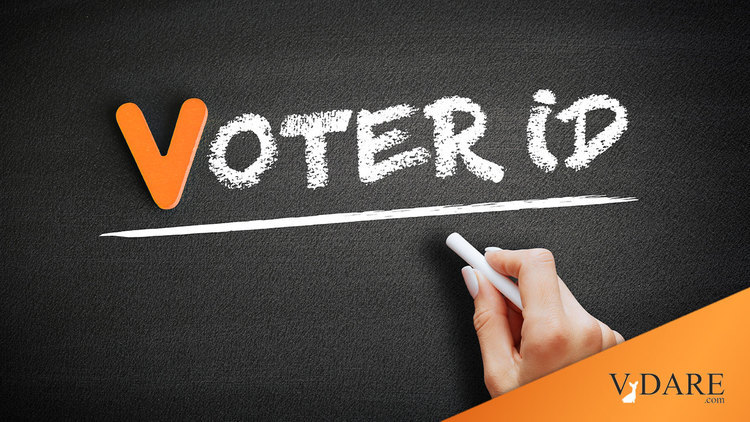
By Allan Wall
01/05/2005
[VDARE.COM note: Allan Wall, our popular Memo From Mexico columnist, is an American citizen who had been living and working legally in Mexico with an FM-2 residency and work permit with his Mexican wife and two children. But his Texas-based Army National Guard company, composed almost entirely of Americans of Mexican ancestry, was mobilized in August. Allan Wall was scheduled to ship out for Iraq after New Year’s Day. He may be there for up to two years.
Allan Wall will be carrying out a special educational research and writing project for VDARE.COM. If you would like to support this project, please send your tax-deductible contribution payable to the Center for American Unity.]
The state of Texas has a slipshod voter registration system, wide open to the possibilities of fraud, abuse and non-citizen voting.
I discovered this myself, when I registered to vote in Texas after being called up for Iraq duty by my Texas Army National Guard unit.
To begin with, I registered to become a Texas voter by mail. I just answered the questions on a card and mailed it in.
I've written before of Mexico’s voter registration system. It’s vastly more secure than that of the Texas system.
Nothing like this exists in the Texas voter registration system.
The Texas voter registration system is easily vulnerable to outside manipulation. Non-citizens can easily vote.
Of course, dual citizens can vote too. When I was still residing in Mexico, before I was called up, I heard a revealing conversation on Mexican radio. A representative for the Kerry campaign was being interviewed. She specifically appealed to dual citizens of Mexico and the United States to vote for Kerry.
The citizenship oath requires immigrants to "abjure foreign potentates." But a few years ago, the Supreme Court mysteriously decreed that immigrants could retain their foreign citizenships anyway.
When I received my Texas absentee ballot and attendant explanations, everything was bilingual — available in both English and Spanish…even though you're supposed to know English to become a naturalized American citizen.
The instructions on the absentee ballot were in both English and Spanish. And the names of the offices were in both languages. For example, President and Presidente.
The ballot envelope had bilingual instructions on it.
And the outer carrier envelope also had bilingual instructions.
In other words, regardless of the naturalization law, knowing English is not a requirement for voting in Texas.
Why is this a problem?
I invite you to read my previous article about the 2002 Texas gubernatorial election, in which candidate Tony Sanchez presented one image to voters in English and another, very different one, in Spanish.
Spanish-language political ads are no longer simply translations of English-language ads. They are now designed differently, to appeal to what are perceived as "Hispanic interests."
"So what?" some might ask. Don’t all politicians tailor their message to particular interest groups? Even in a monolingual society, pandering is a politician’s specialty.
Maybe.
But at least in a monolingual society, an informed voter can more easily monitor what a politician is saying to another audience.
In contrast, America’s hapless English-speaking majority is blissfully ignorant of most of what is being said in the parallel Spanish-language media — whether it’s politics, journalism, or entertainment.
English is the common language of our common civic culture. Throwing it aside in favor of a divisive bilingualism is insane.
They tell us diversity is strength. Well, this is an example. The diversity of national voting systems highlights the flaws that have crept into our own.
Moral: we need to copy Mexico’s voter registration system — now!
Allan Wall’s WORLDNET DAILY National Guard diary is archived here. His VDARE.COM articles are archived here; his FRONTPAGEMAG.COM articles are archived here; his website is here. Readers can contact Allan Wall at .
This is a content archive of VDARE.com, which Letitia James forced off of the Internet using lawfare.